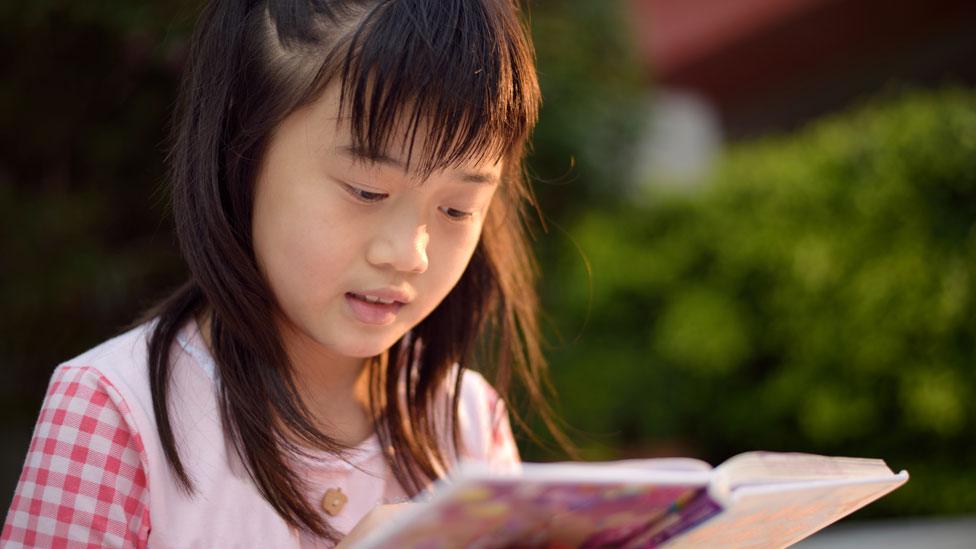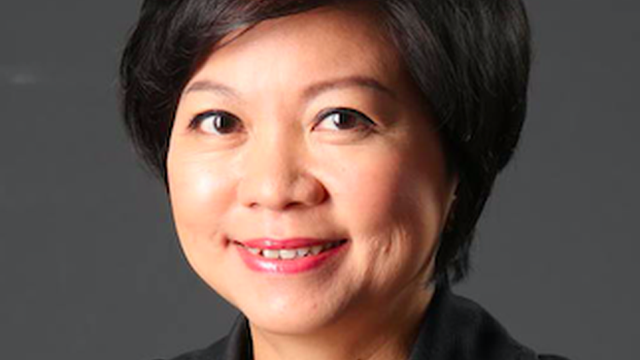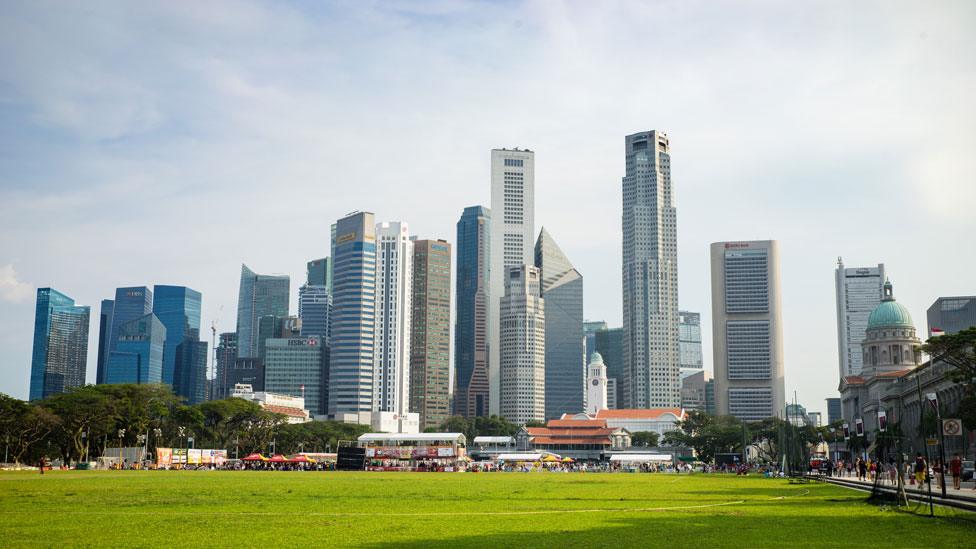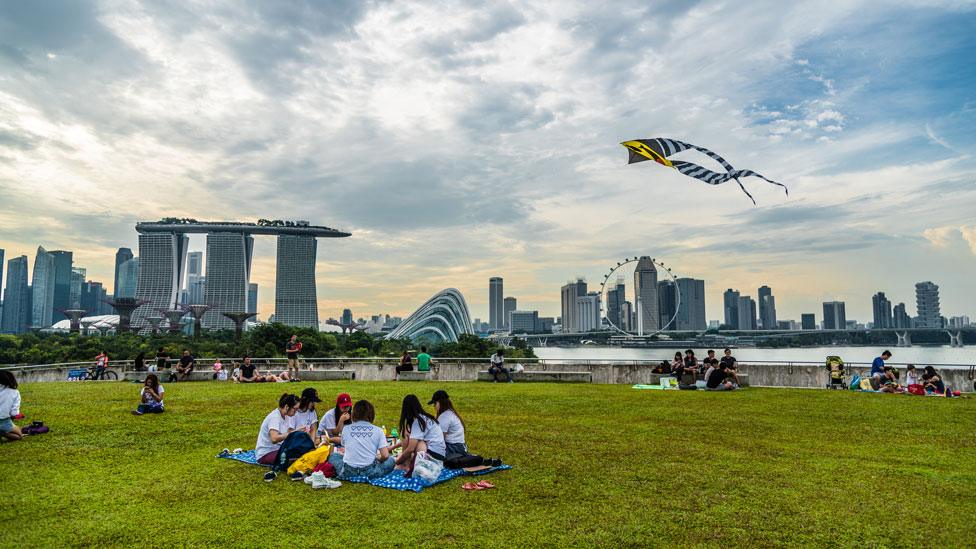Why high-flying Singapore wants more than grades
- Published

Singapore is top of education rankings - but now wants to focus on well-being
Singapore is in top place in the international rankings for education. But it wants the next upgrade of its school system to focus on keeping students positive and resilient.
Dr Lim Lai Cheng, former head of the prestigious Raffles Institution school in Singapore and director at the Singapore Management University, explains the push for character as well as qualifications.
It was no accident that Singapore created one of the world's highest performing education systems in five decades.
Reminiscent of the examinations for selecting mandarins in old China, the road to success in Singapore has always been focused on academic credentials, based on merit and allowing equal access for all.
This centralised system helped Singapore to create social cohesion, a unity of purpose among its schools and an ethos of hard work that many nations envy.
But the purpose of the education system has changed and Singapore in 2017 is no longer the fledgling state it was in 1965.
Schools have become highly stratified and competitive. More advantaged families are better able to support their children with extra lessons outside of school, such as enrichment classes in mathematics, English, dance and music.
Those who can't afford this have to depend on their children's own motivation and the resources of the school to catch up.

Dr Lim Lai Cheng says the school system needs to encourage well-being
This social divide continues to widen because the policies that had won the system its accolades - based on the principle of meritocracy - no longer support the social mobility they were meant to bring about.
So work is in progress to tackle anything in the system that seems to be working against social cohesion.
This time around, it will no longer be enough to develop a highly-skilled workforce to plug into the global economy.

More stories from the BBC's Global education series, external looking at education from an international perspective, and how to get in touch.
You can join the debate at the BBC's Family & Education News Facebook page, external.

The next update of the education system will have to ensure that Singapore can create a more equitable society, build a stronger social compact among its people while at the same time develop capabilities for the new digital economy.
Government policies are moving away from parents and students' unhealthy obsession with grades and entry to top schools and want to put more emphasis on the importance of values.
Schools have been encouraged, especially for the early elementary years, to scrap standardised examinations and focus on the development of the whole child.

Singapore wants its school system to help with character as well as qualifications
"Character scorecards" and "reflection journals" have become the staple in many primary schools, to allow parents to follow the social and developmental progress of their children.
A number of schools have also adopted an approach centred on well-being, as promulgated by Dr Martin Seligman, director of the Positive Psychology Center at the University of Pennsylvania in the United States.
Dr Seligman's model advocates that academic success and well-being form a double helix, and that the best schooling must include educating children on values and character, as well as how to interact well with others, set goals for themselves and work towards achieving those goals.
Positive education, a movement that is gaining momentum across the world, works to create a school culture that supports caring, trusting relationships.

Singapore has built its modern economy on investments in education
It is an approach that focuses on specific skills that assist students to build positive emotions, enhance personal resilience, promote mindfulness and encourage a healthy lifestyle.
This approach has worked well with schools that are trying to implement the new syllabuses for character and citizenship education, launched in the last three years.
An important segment of the new curriculum, at the primary level is family time, and how parents should play an important role in inculcating the right values in their children.
At the secondary and high school levels, "values in action" programmes lie at the core of educating young Singaporeans to be empathetic, socially responsible and active citizens in their community.
For example, students work on projects that serve the elderly, reach out to migrant workers and read to latch-key children in day-care centres.

The emphasis is on character and resilience as well as exam results
There have also been calls for more flexibility over admissions to local top schools and universities to encompass selection based on character traits such as drive, resilience and passion.
To enhance equity, the education ministry has also attempted to spread resources more evenly across schools by rotating experienced principals to schools that need more attention and paying more attention to academically weaker students by strengthening vocational and skills training.
All round, government leaders have expounded a wider definition of success beyond academic grades.
The media and elite schools have been discouraged from showcasing top students and their academic achievements.
There has also been a nationwide initiative called SkillsFuture which puts, in the first instance 500 Singapore dollars (£290) in the hands of every Singaporean from age 25 onwards, for them to pursue lifelong learning, build personal mastery and pursue their passion.
An online databank with at least 10,000 courses that Singaporeans can sign up for, to broaden or deepen their skills or take on new hobbies, is easily accessible.
School-based education and career guidance counsellors are also provided at the primary to tertiary levels, to nurture students' self-awareness, self-directedness and life skills.
Drawn from people with industry experience, the counsellors help students to explore education and career options.
They should be able to help students with information about the skills needed for the digital economy, so that students can go beyond what they learn for exams.
This is a softer approach - emphasising values and character and trying to improve the link between school and work. It's the search for the next formula for education in Singapore.
Dr Lim Lai Cheng is executive director of SMU Academy, Singapore Management University, former head of the Raffles Institution in Singapore and consultant on the board of Winter's International School Finder.